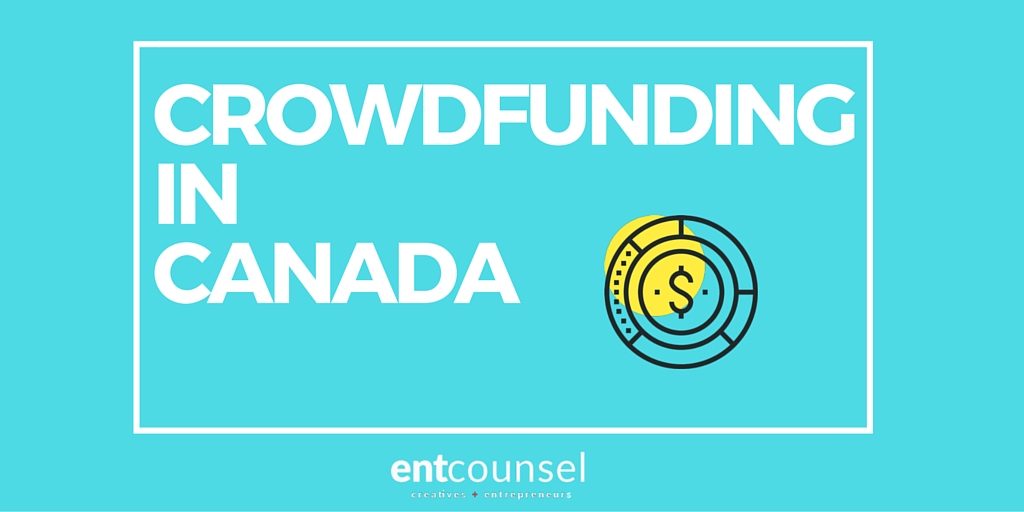What is crowdfunding in Canada? Traditional rules regarding raising capital were re-examined by the Ontario Securities Commission to see how crowdfunding could fit into the existing model. As a result, the OSC’s new rules will now allow business to offer equity stakes through registered crowdfunding via online platforms effective January 25th, 2016.
Kickstarter, Indiegogo and Patreon operate in Canada as crowdfunding platforms but currently don’t obtain any ownership in the business which can now change. The new changes will now permit regular investors to also participate in crowdfunding. This allows starts up and small business gain new ways of raising money while still protecting investors.
What is Crowdfunding – How to Raise Money in Canada with Traditional Methods and through Crowdfunding
Traditional Method of Raising Money – Existing Exemptions
The existing rules regarding raising capital are based on the investor’s relationship with the investee including the investor’s ability to fund any losses. It is premised on the fact that:
1) the investee has made certain disclosures, investment size and offering size
2) the investor has a certain level of financial stability and sophistication to withstand the financial loss. In any investment scenarios, they would be able to obtain expert advice to evaluate whether to invest or not.
There have been traditionally four exemptions to capital raising prospectus based on an investor’s relationship with the issuer (private issuer exemption, rights offering exemption, family, friends and business associates exemption and the founder, control person and family exemption in Ontario and a few others).
1) The Private Issuer Exemption
This allows an issuer to distribute securities to 50 people (excluding current and former employees of the issuer or affiliates) who are in one of the following categories:
- directors, officers, employees, founders or control persons of the issuer
- directors, officer or employees of an affiliate of an issuer
- certain relatives of a director, executive officer, founder or control person and certain relatives of the spouse of a director, executive officer, founder or control person
- a close personal friend or a close business associate of a director, executive officer, founder or control person,
- an existing security holder of the issuer,
- an “accredited investor,” and
- a person that is not in the public
2) The Rights Offering Exemption
- The rights offering exemption. Permits any issuer to offer, to its existing security holders, rights to acquire additional securities without a prospectus. Existing investors are assumed to have the information they need to make an investment decision based on their previous experience and knowledge as an investor with the issuer.
- There are many conditions to and limits on the use of the rights offering exemption:
- the issuer must give the securities regulators prior written notice of the proposed distribution and the regulators have 10 days to object;
- 25% limit; and
- the issuer must prepare a rights offering circular in the prescribed form.
3) The Family, Friends and Business Associates Exemption (in Canadian jurisdiction other than Ontario)
Available in Canadian jurisdictions other than Ontario.
Under the exemption, a person can sell securities to investors who have a direct relationship or connection with the issuer, including:
- a director, executive officer or control person of the issuer or its affiliate
- a family member (spouse, parent, grandparent, brother, sister, child or grandchild) of a director, executive officer or control person of the issuer or its affiliate
- a family member (parent, grandparent, brother, sister, child or grandchild) of the spouse of a director, executive officer or control person of the issuer or its affiliate
- a close personal friend or close business associate of a director, executive officer or control person of the issuer or its affiliate,
- a founder of the issuer or a family member (spouse, parent, grandparent, brother, sister, child or grandchild)
- close personal friend or close business associate of a founder of the issuer
- and a family member (parent, grandparent, brother, sister, child or grandchild) of the spouse
4) The Founder, Control person and Family Exemption in Ontario
In Ontario, in lieu of the family, friends and business associates exemption, Ontario has the founder, control person and family exemption. It applies to a distribution by an issuer of any security to a specified list of purchasers, which includes: a founder of the issuer, an affiliate of a founder of the issuer, certain family members of an executive officer, director or founder of the issuer, and a person that is a control person of the issuer.
Other exemptions include:
- an investment size: $150,000
- disclosure: offering memorandum exemptions outside of Ontario, BC and Alberta model
- investor sophistication: accredited investors, including individuals who meet the following criteria:
- Income. An individual whose net income before taxes exceeded $200,000 in each of the two most recent calendar years or whose net income before taxes combined with that of a spouse exceeded $300,000 in each of the two most recent calendar years and who, in either case, reasonably expects to exceed that net income level in the current calendar year.
- Financial assets. An individual who, either alone or with a spouse, beneficially owns financial assets having an aggregate realizable value before taxes but net of any related liabilities, exceeds $1 million.
What is Crowdfunding in Canada?
Crowdfunding is the ability to sell securities over the internet to a large number of investors providing start-ups and small and medium-sized enterprises additional access to capital.
The Ontario Securities Commission (OSC) proposed reforms on crowdfunding. The OSC examined “Crowdfunding” in the context of raising capital from members of the public through the distribution and sale of securities.
The Ontario Securities Commission (OSC) proposed certain exemptions in the OSC Staff Consultation Paper 45-710 entitled, “Considerations for New Capital Raising Prospectus Exemptions (the “Consultation Paper”). Later, as part of its exempt market review, the Ontario Securities Commission published OSC Notice 45-712 titles, “Progress Report on Review of Prospectus Exemptions to Facilitate Capital Raising (the Progress Report).
What is crowdfunding – the Prospectus Exemption
The Multilateral Instrument 45-108 Crowdfunding includes a crowdfunding prospectus exemption and a registration framework for funding portals.
The initial Progress Report was to examine four new capital raising prospectus exemptions for issuers other than investments funds and included:
1) a crowdfunding exemption along with regulatory requirements for online crowdfunding portal
2) an offering memorandum exemption
3) a family, friends and business associates exemption
4) an exemption that would permit a reporting issuer to issue securities to its existing security holders in reliance on the issuer’s continuous disclosure record.
(the “OM Exemption”).
The purpose is to help start-ups and small and medium-sized enterprises gain greater access to capital markets but also ensuring proper investor protection. In doing so, the OSC reviewed the minimum amount of $150,000 and accredited investor exemptions and exploring whether new prospectus exemptions should be included in Canada. In doing so, the OSC looked at crowdfunding, offering memorandum, “sophisticated” investor and registrant advice.
As a result, the new amendments relating to the OM Exemption known will be effective on January 13, 2016, subject to Ministerial approval. The final amendments regarding crowdfunding in Ontario and participating jurisdictions known as MI 45-108 will come into force on January 25, 2016, subject to Ministerial approval.
What is Crowdfunding? The New Crowdfunding Regime MI 45-108 (took effect January 25, 2016)
Crowdfunding is a means for raising smaller amounts of money through a large number of backers through an internet platform. The Jumpstart Our Business Startups Act (the “JOBS Act”) was released in the United States to create a crowdfunding exemption. The OSC looked at how to protect investors when coming up with a crowdfunding regime and it’s exciting that startups will now have access to capital effective January 25th, subject to Ministerial approval.
The new crowdfunding regime will allow securities to be sold to any investor regardless of income, net worth or financial knowledge.
It is aimed to help startups and small and medium-sized enterprises in Canada. Businesses will now be able to raise capital from a large number of investors through an online portal registered with the securities regulatory authorities.
The new crowdfunding regime would still have limits to protect an investor such as:
- Limits on Offerings – Businesses can raise up to $1.5 million during a 12 month period.
- Issuers can only offer non-complex securities
- For investors that do not qualify as an accredited investor:
- a $2,500 limit in any single investment and
- in Ontario only, a maximum of $10,000 per year for non accredited investors
- For investors that are accredited:
- $25,000 per investment
- in Ontario only, an annual limit of $50,000
- in Ontario only, no investment limits for a permitted client (i.e. an individual with net financial assets exceeding $5 million).
- disclosure requirements with: (i) streamlined information statement and annual financial statements; (ii) annual notice regarding the use of the proceeds raised under the exemption; and (iii) notice in the event of a discontinuation of the issuer’s business, a change in the issuer’s industry or a change of control of the issuer. Reporting issuers must continue to comply with all of their disclosure requirements. Notice of specified key event and books and records must also be provided. Streamlined information statement to include:
- information about the offering
- the issuer
- the funding portal and any other registrant
- a description of all the risk
- one year of financial statements, if any (audited financial statements if proceeds are greater than $500,000 or if the issuer is a reporting issuer).
- risk acknowledgment form to be signed by investors highlighting key risks with the investment. The investor must confirm that they have read and understood the risk warnings and information in the crowdfunding offering document before they enter into an agreement to purchase securities. The Risk Acknowledgment Form must include:
- acknowledgement that investor falls within investment limitations
- acknowledge that they understand that they may lose their entire investment and can bear that loss
- they understand the nature of the investment being non-liquid (in the case of a securities of a non-reporting issuer)
- requirements that all investments be made through a single registered crowdfunding portal that is unrelated to the issuer
- funding portal must review an issuer’s disclosure in the crowdfunding offering document and other permitted materials for completeness, accuracy and any misleading statements
- funding portal are prohibited from offering securities of a related issuer
- Issuers shall be held liable for the crowdfunding document and other permitted materials and investors are provided with a right of action
- There is a prohibition on advertising and general solicitation. The issuer may not advertise an investment other than through the funding portal or through the issuer’s website. However, an issuer may use social media to direct investors to the funding portal or the issuer’s website.
- The issuer is required to prepare an offering document that contains all the information about the issuer and relevant information about its business necessary for an investor to make an informed decision about purchasing an issuer’s securities
- funding portals must review information and obtain background checks on the issuers and its principals (including directors, executive officers and promotors), and deny an issuer access to the funding portal in certain circumstances.
- Issuers can only distribute securities through a single funding portal that is registered as an investment dealer, exempt market dealer or restricted dealer, and must post the offering document and other permitted materials solely on that funding portal’s online platform. All investments under a proposed crowdfunding exemption must be made through a registered funding portal. Funding portals carrying on business in Ontario must register with an appropriate dealer or adviser category in Ontario. The reason being is that investment opportunities being shown to investors and connecting investors with issuers constitute registrable trading or advising activity. A crowdfunding portal is considered to be in the business of trading or advising and subject to dealer or adviser registration. The statutory definition of a “trade” means any act, advertisement, solicitation, conduct or negotiation directly, or indirectly in furtherance of a sale of a security and includes websites that offer securities, and securities information to investors. The registration would be either in the existing dealer or adviser category or in the restricted dealer or adviser category according to the OSC. OSC will also consider exemptions from certain traditional dealer/adviser obligations such as client advice about investments made through a funding portal.
- Qualification Criteria – An issuers, its parent (if applicable) and its principal operating subsidiary (if applicable) must be incorporated or organized under Canadian federal laws of the laws of a Canadian jurisdiction. Further, the issuer must have its head office located in Canada. The majority of the directors of the issuer are resident in Canada. The issuer cannot be an investment fund. The principal operating subsidiary of the issuer, if any, is incorporated or organized under
a) the laws of Canada or any jurisdiction of Canada, or
b) the laws of the United States of America or any state or territory of the United States of America or the District of Columbia;
- Limits on Security – Issuers can only offer non-complex securities. Securities can only be distributed under this exemption:
- common shares
- non-convertible preferred shares
- non-convertible debt securities that are linked only to a fixed or floating interest rate, and
- securities convertible into common shares or non-convertible preferred shares
- a unit of a limited partnership
- a flow-through share under the IT
- Two Day Cooling Off Period – The two day cooling off period permits an investor to withdraw from the date of the investment.
What is Crowdfunding and the Various Models of Crowdfunding
1) What is Crowdfunding – the Donation Model
Individuals contributing to a crowdfunding campaign can donate to a project or venture without receiving anything of value in return
2) What is Crowdfunding – Reward Model
Individuals contributing to a crowdfunding campaign can donate to a project or venture in exchange for a “reward” or “perk”.
3) What is Crowdfunding – Pre-Purchase Model
Individuals contributing to a crowdfunding campaign can donate to a project or venture in exchange for a future reward such as receiving the product being funded
4) What is Crowdfunding – Peer-to-Peer Lending
An online intermediary which helps facilitate money being loaned to a venture by individuals usually in the form of unsecured loans
5) What is Crowdfunding – Equity Security Model
Individuals contributing to a crowdfunding campaign invest in an issuer in exchange for securities. The OSC has written Introducing Equity Crowdfunding: A Primer for Ontario Investors which is very interesting.



